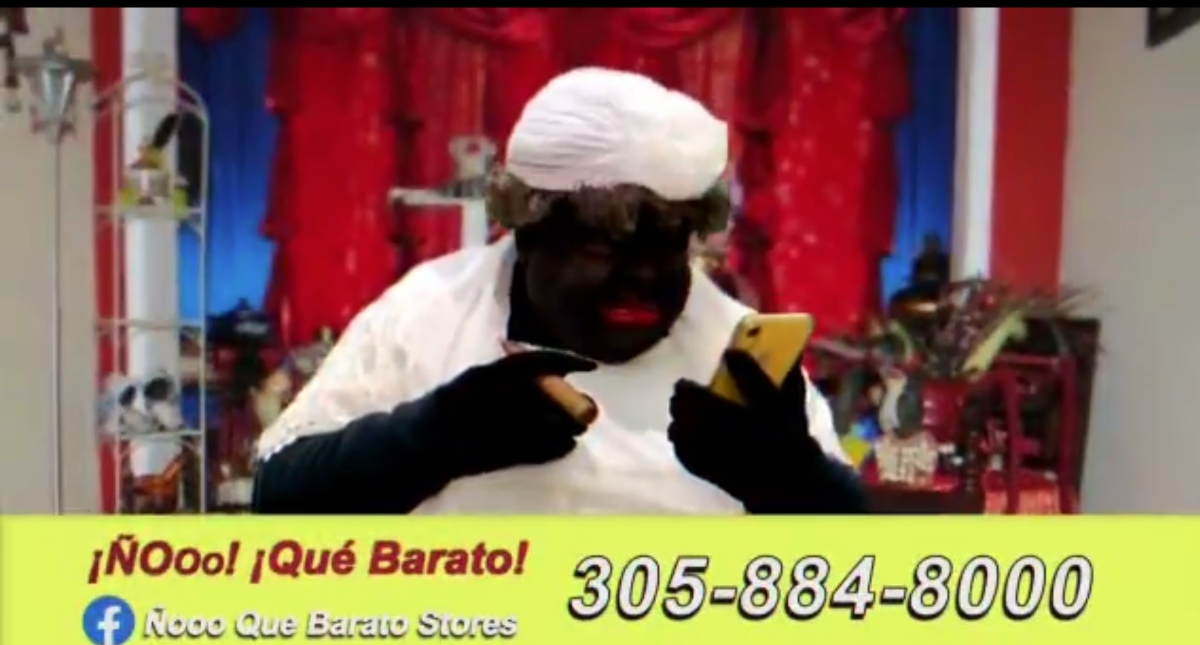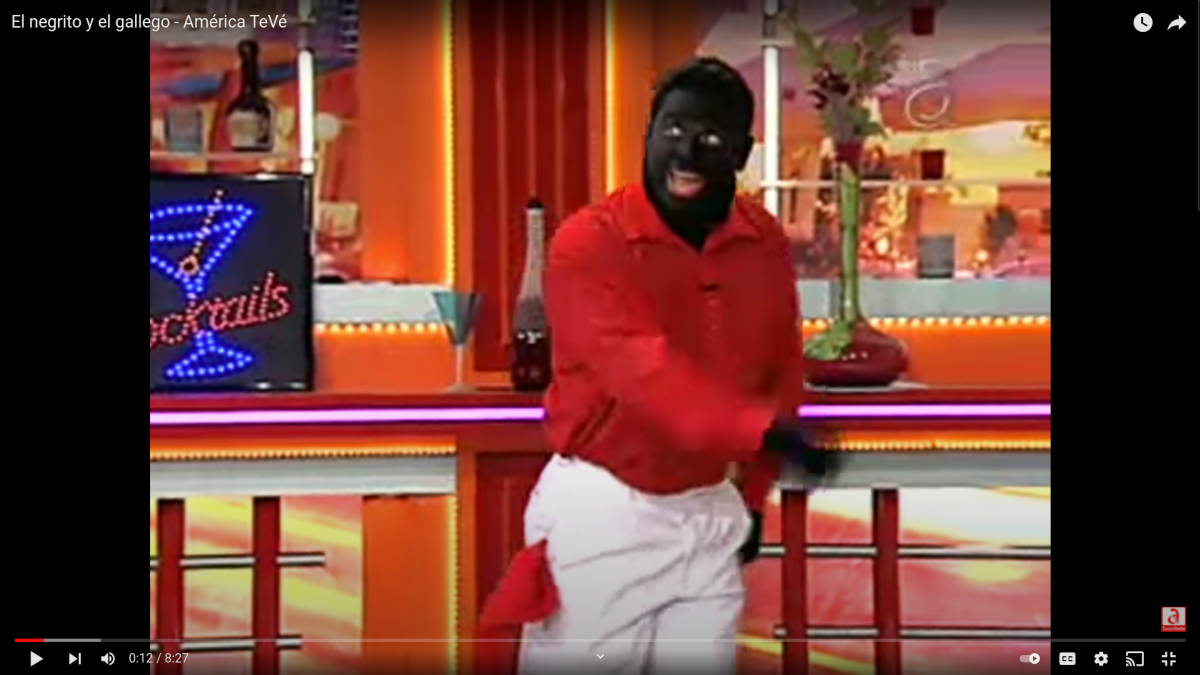
Screenshot via Facebook

Audio By Carbonatix
Update, 2:45 p.m.: Earlier this afternoon, the Á‘ooo! Que Barato! Facebook page removed the blackface video featuring José Pérez Córdoba (AKA Carlucho), following the publication of this story. The video still appears on the @BecauseMiami Twitter account and has been substituted below for the Facebook embed.
The original story:
Hialeah department store Á‘ooo! Que Barato! is known for stocking every staple a Cuban American (or a Cuban) could possibly seek – from guayaberas to school uniforms to pins for cloth diapers to convenient packaging for transporting goods across the Florida Straits to the island.
But a new addition to the popular discount outlet’s advertising arsenal is raising local eyebrows.
On a recent night, a van with a television screen parked on Okeechobee Road beside the store could be seen airing a commercial promoting the store’s line of all-white clothing aimed at Santería practitioners. The ad depicts popular Cuban television show host and comedian José Pérez Córdoba, better known as Carlucho, dressed in drag as a Santería priestess – and in blackface, with his face covered in black greasepaint and wide splotches of bright red lipstick around his mouth.
The video, which is also posted on the Á‘ooo! Que Barato! Facebook page, shows Carlucho on the phone with Afro-Cuban comedian José Téllez Fernández, known by his stage name “El Enano,” who he has presumably dispatched to bring back white skirts and beaded necklaces.
When New Times called Á‘ooo! Que Barato! owner Serafín Blanco on Monday to ask whether he felt some might view the blackface portrayal as racist, Blanco said the possibility hadn’t occurred to him but that he would stop airing the ad if it was thought to be offensive.
Á‘ooo Que Racista: Hialeah department store Á‘ooo! Que Barato! runs blackface commercial "promoting the store's line of all-white clothing aimed at Santería practitioners" #BecauseMiami #BecauseHialeah https://t.co/wDMKxLD9Rw pic.twitter.com/t5qqjrvnvJ
— Because Miami (@BecauseMiami) May 3, 2022
“I don’t think [it’s racist], but if you think it would hurt someone, I can take it out,” the owner said.
Blanco explained that Carlucho is a personal friend and that the comic did the commercial to highlight the store’s Santería-related wares. Though the video was posted in March, Blanco said it had been filmed some time ago.
Carlucho did not respond to an emailed request for comment.
Blackface and minstrelsy have a history in Cuba and the Caribbean as long as in the U.S., though the Cuban perception of such images is markedly different from the present-day North American perspective.
Blackface became popularized as a form of theater in Cuba in the 19th Century as a form of racial mockery after formerly enslaved people and Afro-Cubans demanded inclusion and emancipation. But when Cuban exiles came to the U.S. and particularly Miami in the latter half of the 20th Century, blackface comedy and minstrelsy – known in Cuba as teatro bufo – found new life, according to anthropology professor Ariana Hernandez-Reguant.
“Cuban blackface minstrels…found a welcome in exile,” Hernandez-Reguant and coauthor Jossianna Arroyo-Martínez write in “The Brownface of Latinidad in Cuban Miami,” an essay published on the website CubaCounterpoints.com. “In 2000s Miami, Cubans have used blackface to comment on a new society structured by class and race. The more they themselves have been represented in the U.S. media as brown (recall Scarface, and more recently, Paula Deen’s son as Ricky Ricardo), the more they have claimed a whiteness that should grant them inclusion and a path for upward mobility. In Miami, no matter their immigrant cohort, Cubans report overwhelmingly (over 95 percent) as white. But while their position in a white and black world is unambiguous, their relation to a hybrid, or brown Latinidad, is far more complicated.”
Hernandez-Reguant tells New Times that whereas the U.S. has a longer history of racial reckoning that has made the broader culture aware of the racism and offensiveness inherent in minstrel shows, Cuba has yet to experience such a reckoning, which explains why white Cubans like Blanco and Carlucho don’t see anything wrong with such caricatures.
“Cuba didn’t have a civil-rights movement. There hasn’t been a racial critique,” Hernandez-Reguant says. “When someone like Carlucho does this character, his argument would be that while Americans see this differently, this performance isn’t for Americans.”
Danielle Clealand, an associate professor at the University of Texas at Austin who wrote a 2018 op-ed for the Miami Herald about blackface in Cuban media, adds that while white Cubans have embraced blackface performances, Black Cubans have long called these shows what they are: racist.
“There is an acute awareness that this is anti-Black and racist, and Afro-Cubans have been dealing with these offenses for decades,” Clealand tells New Times. “But I think there is also a resistance in the white Cuban community to valorizing the opinions of Black Cubans.”
Having viewed the Á‘ooo! Que Barato! video, Clealand says the ad is not only offensive on a racial level, but on a cultural level as well.
“It’s not only that it’s blackface, but that it’s mocking Afro-Cuban religion. The way they talk, the way they dress, the kind of non-intellectual way of speaking – it’s playing on negative black stereotypes in violent ways.”

A clip from Carlucho’s erstwhile comedy series El Negrito y El Gallego, in which he portrayed a white Spaniard (El Gallego) opposite a fellow white Cuban actor in blackface as El Negrito.
Screenshot from América TeVé via YouTube
Hernandez-Reguant notes that Carlucho has a history of blackface performance. She recalls the comic’s performance in the comedy series, El Negrito y El Gallego (Blackie and the Spaniard), which aired locally until 2013.
In El Negrito y El Gallego, Carlucho played El Gallego (the white Spaniard), while his partner, Mikail Mulkay, donned blackface makeup and red lipstick as El Negrito.
“He [Carlucho] has been doing this for 20 years. He’s an actor in telenovela, they come from that tradition. [Mulkay’s] father had always done blackface as well,” Hernandez-Reguant says.